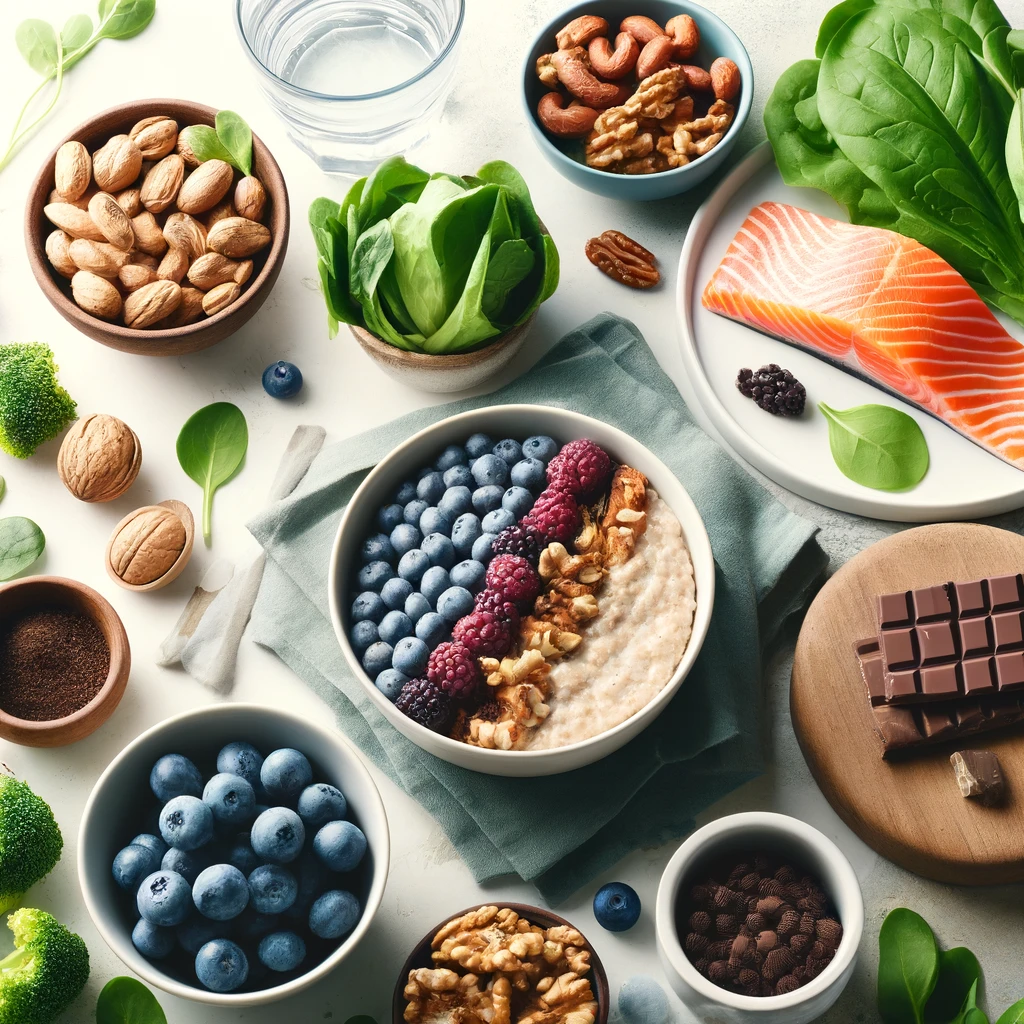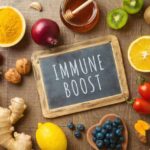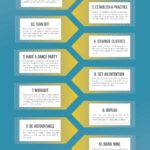The Ultimate Guide to Best Foods to Eat Before Exams: Fueling Your Brain for Peak Cognitive Performance
Exams can be mentally exhausting, requiring sustained concentration, memory retention, problem-solving abilities, and focus. While many students dedicate hours to revising, they often neglect one critical aspect that can influence their performance—nutrition. Similar to athletes who meticulously plan their meals for optimal physical performance, students can boost their brainpower by consuming the right foods. This guide will explore the best brain food to eat before an exam, explaining why certain nutrients are essential for cognitive function and how they impact performance.
Why Nutrition is Crucial for Exam Success
Your brain is the control center for all exam-related tasks, from critical thinking to recalling facts and maintaining attention. Although it only makes up 2% of your body weight, your brain consumes about 20% of your body’s energy, much of which comes from glucose. The quality of the food you eat directly impacts:
- Memory retention: The ability to recall information.
- Focus and attention: Staying on task during long exams.
- Cognitive flexibility: The capacity to problem-solve and process complex information.
How Macronutrients Support Brain Function
The three primary macronutrients—carbohydrates, proteins, and fats—play essential roles in supporting brain function.
- Carbohydrates provide the glucose needed for energy. Complex carbohydrates, such as whole grains, offer sustained energy, whereas simple carbs cause rapid spikes and crashes in energy levels.
- Proteins are vital for producing neurotransmitters like dopamine and serotonin, which influence mood, motivation, and overall cognitive performance.
- Fats, particularly omega-3 fatty acids, are crucial for maintaining brain structure, supporting memory, and enhancing neuron communication.
Understanding how these nutrients fuel your brain can help you choose the right foods to optimize exam performance.
The Best Foods to Eat Before Exams
Let’s dive into the top brain foods that can support cognitive function and improve your performance during exams.
1. Oats and Whole Grains: Slow-Release Carbohydrates for Sustained Energy
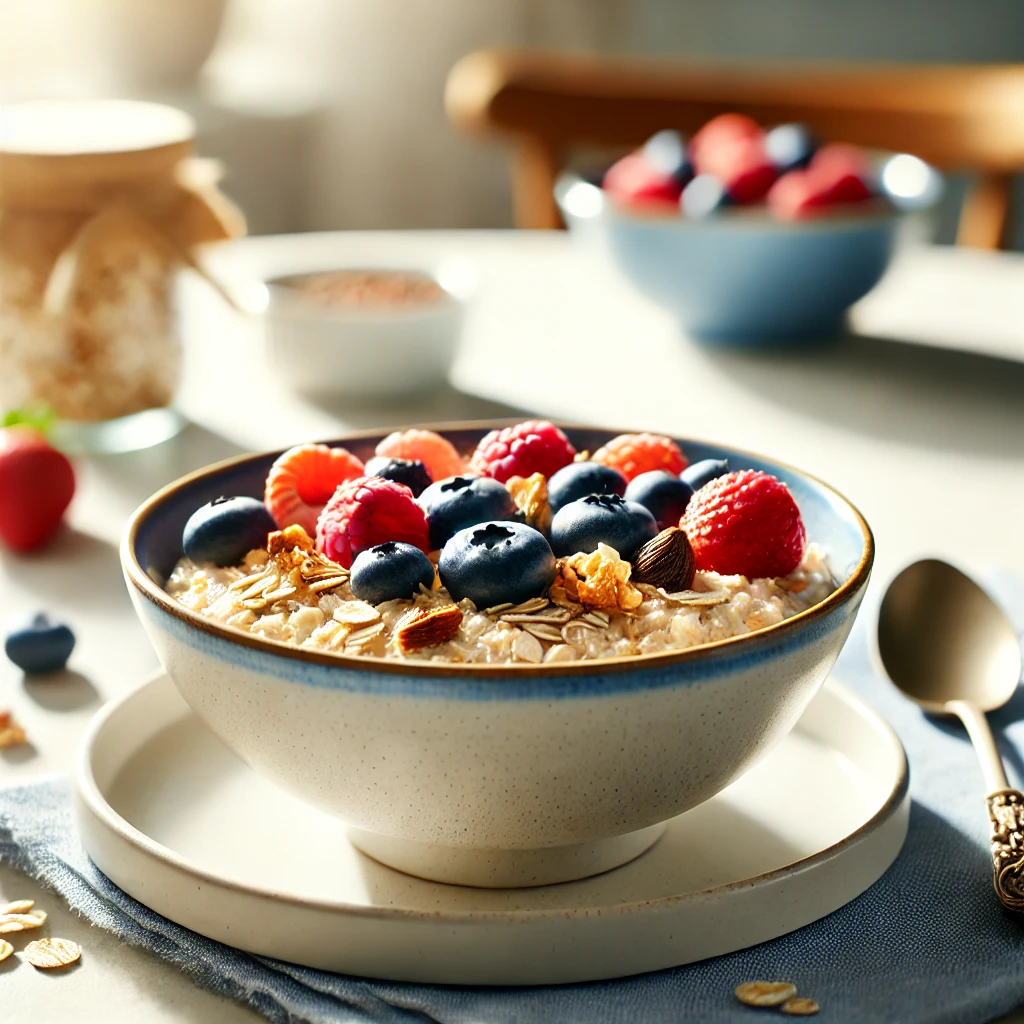
Whole grains like oats, quinoa, and brown rice provide slow-releasing carbohydrates that stabilize blood sugar levels and ensure a consistent supply of energy to the brain. Oats are particularly rich in beta-glucan, a type of soluble fiber that keeps hunger at bay and supports focus.
Scientific Insight:
A study published in the Journal of Nutrition revealed that participants who consumed whole grains had better cognitive performance and mood stability than those who ate refined carbohydrates.
Actionable Tip: Start your exam day with a bowl of oatmeal topped with nuts, seeds, and berries for an energy-boosting breakfast.
2. Fatty Fish: Omega-3s for Memory and Cognitive Flexibility

Fish like salmon, mackerel, and sardines are rich in omega-3 fatty acids, particularly DHA, which is crucial for brain health. Omega-3s improve memory, cognitive flexibility, and focus. They also reduce neuroinflammation, which can impair cognitive function.
The Science Behind Omega-3s:
A review published in Frontiers in Aging Neuroscience found that higher intake of omega-3s, especially DHA, significantly improved cognitive function in both young adults and the elderly.
Real-World Case Study: At King’s College London, researchers found that individuals with higher omega-3 levels performed better on memory tests and exhibited greater cognitive resilience under stress.
Actionable Tip: Include grilled salmon in your pre-exam dinner, or opt for a fish oil supplement if time is tight.
3. Eggs: Choline for Memory and Neuroplasticity

Eggs are a powerful source of choline, a nutrient necessary for producing acetylcholine, a neurotransmitter essential for memory and learning. Choline also supports neuroplasticity, the brain’s ability to form new connections—especially useful when learning new material.
Choline’s Role in Memory:
A study published in the American Journal of Clinical Nutrition showed that individuals with high dietary choline intake had better verbal and visual memory, underlining the importance of this nutrient in brain health.
Actionable Tip: Include eggs in your pre-exam meal. Scrambled eggs on whole-grain toast offer a balanced combination of protein and carbohydrates.
4. Blueberries: Antioxidants for Brain Protection

Blueberries are loaded with antioxidants, particularly flavonoids, which protect the brain from oxidative stress and improve communication between neurons. Regular consumption has been linked to enhanced memory, attention, and overall cognitive function.
Research Spotlight:
A study in the Journal of Agricultural and Food Chemistry found that blueberries significantly improved cognitive performance in older adults. In younger populations, short-term blueberry consumption boosted memory and attention during mentally demanding tasks.
Real-World Application: Harvard researchers suggest that eating a cup of blueberries before mentally strenuous activities like exams can enhance performance on memory-based tasks.
Actionable Tip: Combine blueberries with Greek yogurt for a nutrient-packed snack that supports brain health.
5. Dark Chocolate: Focus and Mood Enhancer
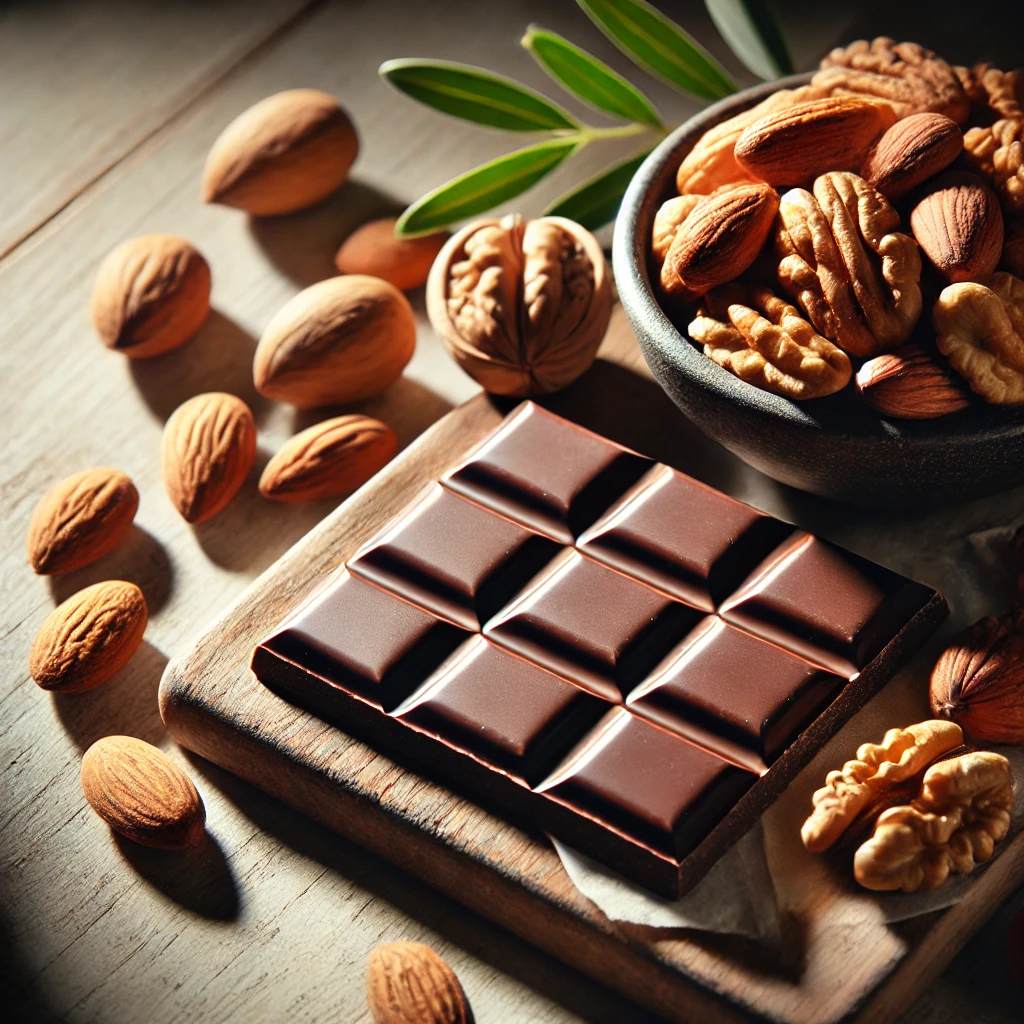
Dark chocolate with at least 70% cocoa content is a perfect pre-exam treat, providing flavonoids, caffeine, and theobromine—all of which increase blood flow to the brain, improve focus, and enhance mood. These compounds work together to keep you alert without the jitters associated with coffee.
The Science Behind Dark Chocolate:
A study published in Nutrients found that flavonoids in dark chocolate enhance cognitive function, particularly in areas related to learning and memory.
Actionable Tip: Snack on a small square of dark chocolate before or during study sessions to maintain focus.
6. Nuts and Seeds: Nutrient-Dense Brain Food
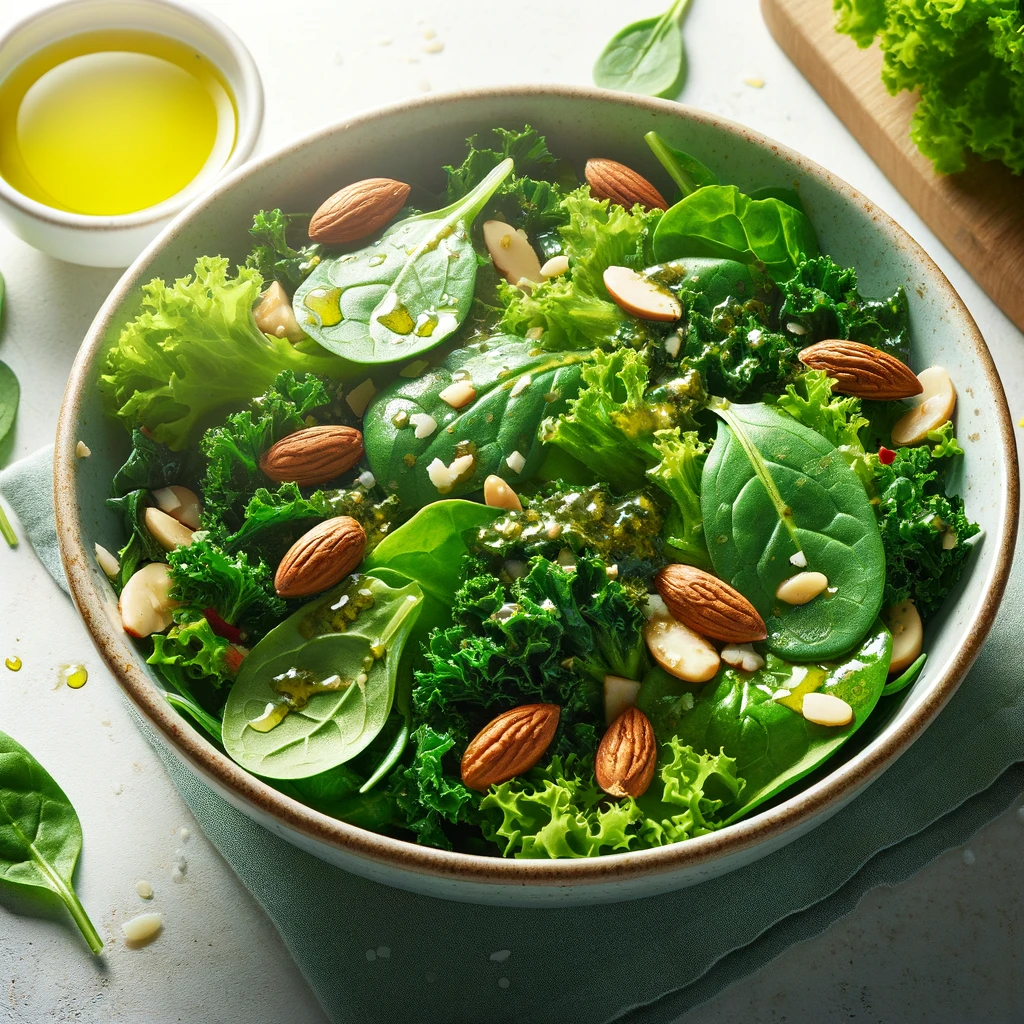
Nuts and seeds, such as walnuts, almonds, and flaxseeds, are rich in healthy fats, protein, and antioxidants. They also contain vitamin E, which protects brain cells from oxidative stress, and magnesium, which is essential for neurotransmitter function.
Research Insight:
The European Journal of Nutrition published a study showing that regular consumption of nuts, particularly walnuts, is linked to improved cognitive performance and slower cognitive decline.
Actionable Tip: Keep a handful of mixed nuts and seeds handy for a quick snack during study breaks to maintain energy levels and mental clarity.
7. Leafy Greens: Brain-Boosting Nutrients
Leafy greens like spinach, kale, and Swiss chard are packed with brain-healthy nutrients, including folate, vitamin K, and lutein. These nutrients help protect against cognitive decline and support brain cell growth.
Scientific Evidence:
A study published in Neurology found that individuals who ate at least one serving of leafy greens daily experienced slower cognitive decline than those who consumed fewer vegetables.
Actionable Tip: Add a leafy green salad with olive oil and walnuts to your pre-exam meals for a nutrient boost.
Foods to Avoid Before Exams
While certain foods can enhance brain function, others can hinder it. Avoid these common dietary pitfalls:
1. Sugary Snacks and Beverages
Sugary foods provide a quick energy boost but are followed by a sharp crash. This rollercoaster effect can lead to irritability, fatigue, and difficulty focusing—none of which you want during an exam.
2. Processed and Fast Foods
Highly processed foods often contain unhealthy fats, refined carbohydrates, and excess sodium, which can make you feel sluggish and mentally foggy. Trans fats, in particular, have been linked to poor brain health.
3. Excessive Caffeine
While caffeine can boost alertness in moderate amounts, too much can lead to jitters, anxiety, and dehydration, all of which can negatively impact exam performance.
Timing: When to Eat for Maximum Performance
The timing of your meals can be just as important as the foods you eat. Eating too close to the exam may leave you feeling bloated, while skipping meals can cause hunger-related distractions.
Ideal Meal Timing:
- 2–3 hours before the exam: Have a balanced meal rich in complex carbohydrates, proteins, and healthy fats to fuel your brain for sustained focus.
- 1 hour before the exam: Eat a small snack such as a banana with peanut butter or a handful of mixed nuts to stabilize your blood sugar.
Hydration: The Unsung Hero of Cognitive Performance
Staying hydrated is crucial for maintaining cognitive function. Even mild dehydration can impair concentration, short-term memory, and decision-making abilities.
Scientific Backing:
A study published in Frontiers in Human Neuroscience found that students who drank water during exams performed better on cognitive tests than those who did not. Proper hydration improves focus and reaction time, making it a key factor for exam success.
Actionable Tip: Drink plenty of water leading up to the exam, and take small sips throughout if allowed.
Frequently Asked Questions
1. What are the best foods to eat before an exam to improve concentration?
Foods rich in omega-3 fatty acids, such as salmon, and complex carbohydrates from whole grains are excellent for enhancing focus.
2. How soon should I eat for maximum benefit?
It’s best to eat a balanced meal 2–3 hours before your exam, with a light snack about an hour beforehand.
3. Can the best foods before exams reduce anxiety and stress?
Yes, foods like leafy greens, fatty fish, and whole grains contain nutrients that can stabilize mood and reduce stress.
4. What are some quick snacks that qualify as brain food?
Nuts, dark chocolate, blueberries, and Greek yogurt make for quick, nutritious snacks that can improve cognitive function.
Conclusion: Eating Smart for Exam Success
The foods you eat in the days and hours leading up to an exam can significantly influence your performance. Prioritize nutrient-rich options like fatty fish, whole grains, nuts, and blueberries, and stay well-hydrated to ensure optimal brain function. By making these smart dietary choices, you’ll give yourself the best chance to excel in any exam.
Actionable Next Step: Begin incorporating these brain-boosting foods into your diet today to set yourself up for academic success. Eating the right foods before exams isn’t just about fueling your body—it’s about optimizing your brain for peak performance.
For more information on a wider range of nutrient-packed options, check out our detailed guide on the Top 16 Healthy Foods. This comprehensive list offers even more ways to support your body and mind with optimal nutrition!
Harvard T.H. Chan School of Public Health – Healthy Weight – This article offers insights into how different diets and nutritional strategies impact weight loss and overall health, supported by research and expert recommendations.
